المراقبة والتقييم
لا تتعلق معظم تحديات الرصد والتقييم، مثل الافتقار إلى الاستثمار والقدرات الكافية، تحديدًا بالمساعدات النقدية والقسائم. لكن تلك التي تتعلق في المقام الأول برصد نتائج عمليات النقل غير المقيدة. ويمكن أن تجعل مرونة التحويلات النقدية من الصعب تحديد مؤشرات النتائج المناسبة، لأنها قد تتضمن مجموعة من المؤشرات القطاعية والشاملة. وفي الوقت نفسه، هناك قيود على جمع بيانات دقيقة حول كيفية إنفاق التحويلات النقدية.
التزم الموقعون على الصفقة الكبرى بضمان وجود آليات الرصد والتقييم ذات الصلة فيما يتعلق بالنقد، وزيادة فهم التكاليف والفوائد والآثار والمخاطر المتعلقة بالنقد بالنسبة للطرائق الأخرى. بناءً على ذلك، يحتوي مسار الصفقة الكبرى على نقاط عمل بما في ذلك تطوير مؤشرات نتائج مشتركة للمساعدات النقدية متعددة الأغراض، ومقاييس لتحليل القيمة مقابل المال. تم تقييد التحليل المنهجي للقيمة مقابل المال بسبب عوامل تشمل عدم وجود نهج متفق عليها، والحاجة إلى بيانات نتائج عالية الجودة، وطبيعة التحليل.
الأولويات الحالية
في إطار الالتزامات النقدية للصفقة الكبرى، شاركت شبكة CALP (مع الوكالة الأمريكية للتنمية الدولية وخدمات الإغاثة الكاثوليكية) في تطوير مؤشرات النتائج للمساعدات النقدية متعددة الأغراض. وتُتاح مسودة الاختبار حاليًا باللغات الإنجليزية والفرنسية والإسبانية عبر مكتبة شبكة CALP.
Related initiatives
Featured content

Multipurpose Cash Outcome Indicators – Final Draft for Testing
Guidelines and Tools
Note that the MPC indicators have now been revised. Please click here to access the updated Multipurpose Outcome Indicators and Guidance, which is available in Arabic, English, French and Spanish. Multipurpose Cash Outcome Indicators – Final Draft for Testing Multipurpose cash (MPC) is a type of assistance intended to enable people to meet their basic needs through local...

Monitoring 4 CTP: Monitoring Guidance for CTP in Emergencies
Guidelines and Tools
This guidance provides a central resource to promote a common understanding of the most important monitoring considerations for humanitarian projects using cash transfer programming (CTP). The primary audience for this guidance is field-level practitioners, from organisations directly involved in the design, implementation, monitoring, and accountability of projects using cash and vouchers...

Cost-Efficiency Analysis of Basic Needs Programs: Best Practice Guidance for Humanitarian Agencies
Guidelines and Tools
The Efficiency, Effectiveness and Value for Money Sub-Workstream is pleased to share the final output on Cost-Efficiency Analysis of Basic Needs Programs: Best Practice Guidance for Humanitarian Agencies (attached).
Cost-efficiency analysis estimates the ratio of program costs to outputs created, allowing you to compare cost-per-output for programs which all produced the same output. Such...
Thematic lead
Latest

Cash Transfer and Community Resilience Programming in South Central Somalia
Blog Post
The Building Resilience in Central Somalia (BRCiS) attempts to provide immediate humanitarian assistance as well as developing longer term local capacity through a combination of locally adapted cash-for-work and unconditional cash transfers.
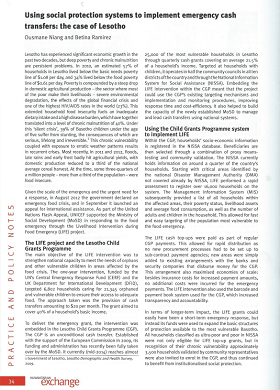
Using Social Protection Systems to Implement Emergency Cash Transfers: The case of Lesotho
Case Study
Lesotho has experienced significant economic growth in the past two decades, but deep poverty and chronic malnutrition are persistent problems. Given the scale of the emergency and the urgent need for a response, in August 2012 the government declared an emergency food crisis, and in September it...

Cash Transfers: Progress made but challenges remain
Blog Post
In five years cash programming has come from almost nowhere to being – for some donors at least – the preferred option, especially in the field of food and nutrition. “We no long measure food aid contributions in wheat/tons equivalent,” says Julia Stewart-David of the EU aid body, ECHO. “That...

USAID Procurement Executive’s Bulletin 2014-06
Policy paper
This Bulletin applies to USAID’s Acquisition Workforce consisting of Contracting Officers (COs), Agreement Officers (AOs), Negotiators, CO/AO Representatives (CORs/AORs), and Activity Managers worldwide. The purpose of this bulletin is to provide guidance to the Acquisition Workforce on promoting...

Annex B: Lebanon Case Study
Report
Cash and vouchers are increasingly provided as assistance to people affected by disaster and crisis. Studies and evaluations have firmly established that cash transfers can be an appropriate alternative or complement to in-kind assistance. Whilst some evidence exists on the Value for Money (VfM) of...

Mobile Cash Transfers for Urban Refugees in Niamey, Niger
Report
This study compared the effectiveness of cash transfers delivered through mobile phone and microfinance institutions to urban refugees in Niamey. The study found that the mobile phone delivery mechanism could be more cost-efficient than the MFI mechanism, after initial set up costs associated to...

Information and communications technology response to the Liberia ebola crisis
Report
An information and communication technology assessment recently conducted in Liberia by NetHope and USAID addresses the potential for digital payments in the response to Ebola. The documents looks into the digital payments landscape, describing the banking sector, use of mobile money and remittance firms....
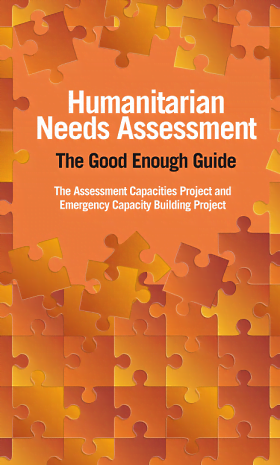
Humanitarian Needs Assessment – The Good Enough Guide
Report
Needs assessment is essential for programme planning, monitoring and evaluation, and accountability, however needs assessment is still a critical weakness of humanitarian response. Organizations urgently need to improve how they do assessments. The humanitarian community has been working on this issue...

Is Cash Transfer Programming ‘Fit for the Future’? – Annexes
Report
This Annex Package contains the full set of products developed in the course of a 2013 research study entitled, Is Cash Transfer Programming ‘Fit for the Future’? The research was commissioned by the Cash Learning Partnership (the CALP Network) and undertaken by the Humanitarian Futures Programme...

Planning for government adoption of a social protection programme in an insecure environment: the Child Grant Development Programme in northern Nigeria
Report
Cash transfer programming (CTP) is increasingly used in West Africa in response to food and nutritional crisis. Beyond emergency situations, cash transfer mechanisms are key mechanisms for national social protection strategies and policies. Despite the rapid development of social...

Lesotho Child Grants Programme – The historic and future costs of the CGP and its affordability
Report
The purpose of this costing study is to review the historical costs of the Child Grants Programme (CGP) between October 2007 and December 2012, simulate the likely future cost of the programme, and assess the programme’s affordability under the current fiscal environment. This report presents the...
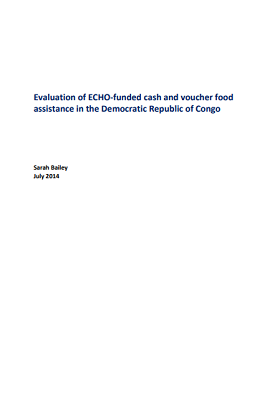
DRC Cash and Vouchers Food Security Evaluation (2014)
Report
People in eastern Democratic Republic of Congo (DRC) have long faced protracted conflict and instability resulting in the displacement of populations. In order to provide households affected by new displacements with timely access to food, ECHO funded the Norwegian Refugee Council (NRC), the Association...
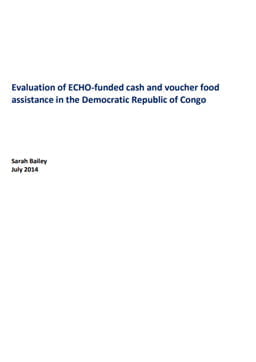
Evaluation of ECHO-Funded Cash and Voucher Food Assistance in the Democratic Republic of Congo
Report
People in eastern Democratic Republic of Congo (DRC) have long faced protracted conflict and instability resulting in the displacement of populations. In order to provide households affected by new displacements with timely access to food, ECHO funded the Norwegian Refugee Council (NRC), the Association...
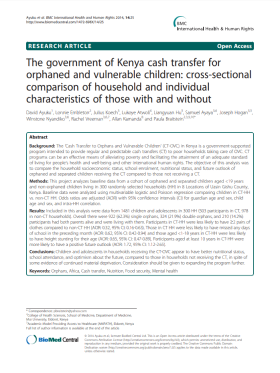
The Government of Kenya Cash Transfer for Orphaned and Vulnerable Children: Cross-sectional Comparison of Household and Individual Characteristics of Those With and Without
Report
The ‘Cash Transfer to Orphans and Vulnerable Children’ (CT-OVC) in Kenya is a government-supported program intended to provide regular and predictable cash transfers (CT) to poor households taking care of OVC. CT programs can be an effective means of alleviating poverty and facilitating the attainment...
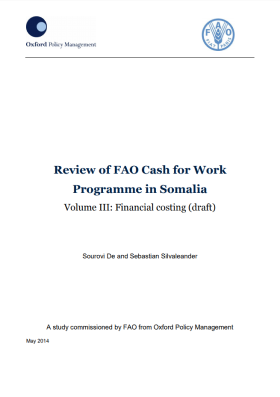
Review of FAO Cash for Work Programme in Somalia
Report
The objective of this costing study is to understand the absolute and relative magnitudes of various drivers of programme costs and to assess the cost-efficiency of the CFW Programme’s operations, using the total cost-to-transfer ratio (TCTR) for the programme which represents the total cost incurred by...
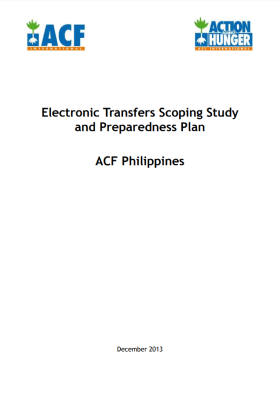
Electronic Transfers Scoping Study and Preparedness Plan
Policy paper
This piece of work was arranged by Action Against Hunger (ACF), with the intention of understanding the electronic payment services available in a minimum of two country missions and to support ACF in preparing for future humanitarian response in country and globally, with a specific focus on...
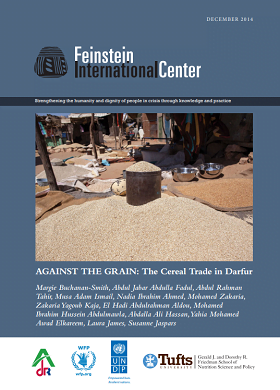
Against the Grain: The Cereal Trade in Darfur
Report
WFP began to pilot food vouchers in Darfur in 2010 as an alternative to general food distribution. The main purpose of the voucher program is greater cost-efficiency for WFP, increased choice for beneficiaries, and strengthening of markets. It is also expected to create market multiplier effects and...
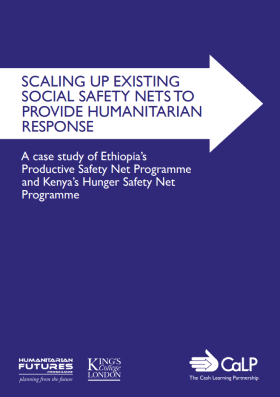
Scaling Up Existing Social Safety Nets to Provide Humanitarian Response: A case study of Ethiopia’s Productive Safety Net Programme and Kenya’s Hunger Safety Net Programme
Policy paper
A case study of Ethiopia’s Productive Safety Net Programme and Kenya’s Hunger Safety Net Programme. This thematic report has been undertaken as part of a 2013 research study entitled, Is Cash Transfer Programming ‘Fit for the Future’? The research was commissioned by the the CALP Network and...
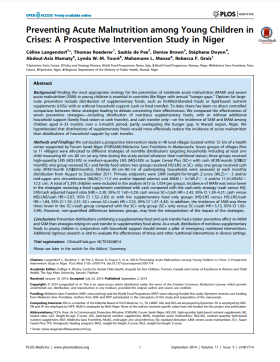
Preventing Acute Malnutrition Among Young Children in Crises: A prospective intervention study in Niger
Report
Governments and donor agencies need to know which preventative strategy is most effective, particularly among children under 2 years old who are most vulnerable to acute malnutrition. Here, the researchers compare the effectiveness of seven preventative strategies—including the distribution of...
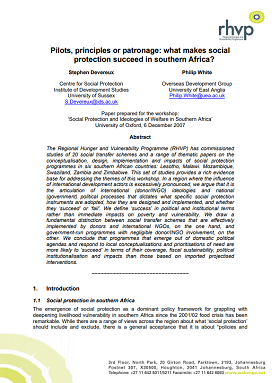
Pilots, principles or patronage: what makes social protection succeed in southern Africa?
Report
The Regional Hunger and Vulnerability Programme (RHVP) has commissioned studies of 20 social transfer schemes and a range of thematic papers on the conceptualisation, design, implementation and impacts of social protection programmes in six southern African countries: Lesotho, Malawi....
